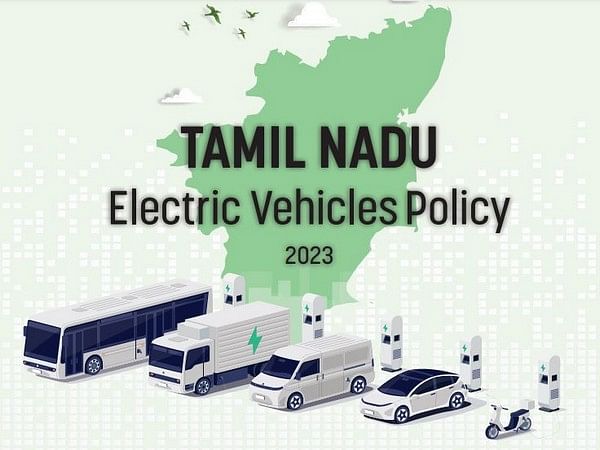Chennai (Tamil Nadu) [India], February 14 (ANI): Tamil Nadu government has launched its Electric Vehicles Policy-2023, with an aim to increase the usage of electric vehicles to transform the state into a preferred destination for EV manufacturing.
Tamil Nadu Chief Minister M K Stalin released the ‘Tamil Nadu Electric Vehicles Policy 2023’ and the government aims to attract Rs 50,000 crore worth of investment in EV manufacturing during the policy period.
The policy shall be valid for five years from the date of the policy notification, or until a new one is announced, according to a government release.
Among many features, the policy document shows the state wants to provide reimbursement on SGST, turnover-based subsidies, capital subsidy, and special Advanced Chemistry Cell capital subsidy.
The released electric vehicle policy document also mentioned the developing EV cities in Tamil Nadu. Cities like Chennai, Coimbatore Tiruchirappalli Madurai, Salem and Tirunelveli are to be pilot cities for implementing e-mobility solutions.
Tamil Nadu’s growth as an automotive manufacturing hub reflects in the presence of large automobile manufacturers like Hyundai, Nissan, TVS, Mahindra, and Daimler, the release said.
The strong manufacturing ecosystem in the state has encouraged new entrants like Ather Electric, Ola Electric, Ampere and others to establish their electric vehicle manufacturing units.
During the Covid-19 pandemic, the state signed MoUs with an investment interest of nearly Rs 24,000 crore in the EV value chain, the new policy document said.
It had established Tamil Nadu Green Climate Company, a Special Purpose Vehicle (SPV), to collaborate and strengthen community engagement to build a long-term commitment toward a Net-Zero Carbon future.
The new EV policy also talked about accelerating adoption in Tamil Nadu through special demand incentives and developing charging infrastructure with favourable power tariffs through public/private measures.
At the COP26 summit in Glasgow in 2021, India committed to an ambitious five-part “Panchamrit” pledge, including reaching 500 GW of non-fossil electricity capacity, to generate half of all energy requirements from renewables, to reduce emissions by 1 billion tons by 2030.
India also aims to reduce the emissions intensity of GDP by 45 per cent. Finally, India commits to net-zero emissions by 2070. Notably, India banned several single-use plastics from July 2022. (ANI)
This report is auto-generated from ANI news service. ThePrint holds no responsibility for its content.



